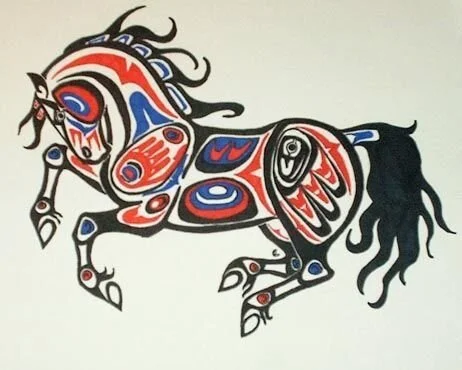KIUATAN
[KIU'-a-tan] or [KHI-YU-tun] — noun.
Meaning: Horse
Origin: Generally believed to be from Chinook i-kiuatan < ikee’utan ‘horse’, though some sources claim it is of Mamachatpam (Yakima) origin.
There are several words for horses used in Chinook Wawa, though kiuatan seems to have been used more in southern regions of Cascadia, and is the most commonly used word in modern publications.
While the word simply means ‘horse,” it also extends to a number of types of horses, such as “tenas kiuatan” (colt; pony), klootchman kiuatan” (mare), "cooley kuitan” (a race horse), “lemolo kiuatan (mustang; wild horse)” and “stone kiuatan” (stallion; ungelded horse). This last term should not be confused with the act of “mamook klak stone kiuatan” (to castrate a horse), which would give you a “burdash kiuatan” (gelding). It is also the bases of a variety of words for older horses, such as “oleman kiuatan” (old horse), “hyas oleman kiuatan” (a very old horse), and “oleman klootchman kiuatan” or “lamai kiuatan” (old mare, nag), and included words pertaining to parts of horses, like "kuitan lepee" (hoofs), professions associated with horses, such as “kuitan kapswolla" (horse thief), and activities involving horses, such as "klatawa kopa kuitan" (to ride; go by horse).
If you are on a long ride and someone tells you "nesika kuitan delate till" (our horses are very tired), then it would be best to stop and let them rest. Once stopped, someone might ask you "mika mamook kow mika kuitan?" (have you tied your horse?). If not, than you had best "kow mika kuitan" (tie your horse), otherwise the next question someone will probably be asking you will be “mika na klap mika kiuatan?” (did you find your horse?)
A HORSE IS A HORSE OF COURSE OF COURSE
"Okoke mika kuitan?" (is this your horse?)
"Okoke kuitan kopa Alex." (This is Alex’s horse.)
"Yaka hyas kloshe kuitan?" (Is that a good horse?)
"Nika kuitan elip kloshe kopa yaka kuitan." (My horse is better than his horse).
Okoke kuitan yaka hyas oleman" (That horse is very old.)
A HORSE OF A DIFFERENT COLOR
Pil kiuatan comes from the Chinook particle “tlpil”, used for a bay or chestnut horse (i.e. red horse).
Leblow (also spelled Lablow or Leblau) comes from the French “Le Blond”, used for a sorrel or chestnut-coloured horse.
Leclem (also spelled Laclem, or Leklem) comes from the French “Le Creme”, used for a cream-colored or light dun horse.
Legley (also spelled Lagley) comes from the French “Le Gris” or English “Gray”, used for a gray-colored horse.
Sandelie (also spelled Sandelee) comes from the French “Cendre” or English “Sandy”, used for a roan or ash-colored horse.
Lekye (also spelled Lakai or Lekay) comes from French-Canadian word “La Caille”, used for an appaloosa or a piebald horse.








